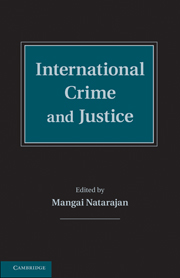Book contents
- Frontmatter
- Contents
- List of Figures
- List of Tables
- List of Contributors
- Foreword
- Preface
- Introduction
- Part I International Criminology
- Part II Law, Punishment, and Crime Control Philosophies of the World
- Part III Transnational Crime
- Part IV Organized Crime and Terrorism
- Part V International crime
- Part VI Delivering International Justice
- 44 The Role of the United Nations
- 45 Treaties and International Law
- 46 International Criminal Tribunals and Hybrid Courts
- 47 The International Criminal Court
- 48 The ICC and the Darfur Investigation
- 49 Victims’ Rights in the International Criminal Court (ICC)
- 50 Nongovernmental Organizations and International Criminal Justice
- 51 Global and Regional Human Rights Commissions
- 52 The Truth and Reconciliation Commission in South Africa
- 53 The Guatemalan Truth Commission
- Part VII International Cooperation and Criminal Justice
- Part VIII International Research and Crime Statistics
- Part IX International research resources
- World Map
- Index
- References
49 - Victims’ Rights in the International Criminal Court (ICC)
Published online by Cambridge University Press: 05 October 2014
- Frontmatter
- Contents
- List of Figures
- List of Tables
- List of Contributors
- Foreword
- Preface
- Introduction
- Part I International Criminology
- Part II Law, Punishment, and Crime Control Philosophies of the World
- Part III Transnational Crime
- Part IV Organized Crime and Terrorism
- Part V International crime
- Part VI Delivering International Justice
- 44 The Role of the United Nations
- 45 Treaties and International Law
- 46 International Criminal Tribunals and Hybrid Courts
- 47 The International Criminal Court
- 48 The ICC and the Darfur Investigation
- 49 Victims’ Rights in the International Criminal Court (ICC)
- 50 Nongovernmental Organizations and International Criminal Justice
- 51 Global and Regional Human Rights Commissions
- 52 The Truth and Reconciliation Commission in South Africa
- 53 The Guatemalan Truth Commission
- Part VII International Cooperation and Criminal Justice
- Part VIII International Research and Crime Statistics
- Part IX International research resources
- World Map
- Index
- References
Summary
INTRODUCTION: GOALS OF THE ICC
The unprecedented role for victims in the International Criminal Court (ICC) proceedings is an important feature of the ICC, a judicial institution that should fulfill – at the same time – the criminal justice goals of prevention and retribution as well as truth-telling and reparation. Hence, it is very important to understand that such goals are present in the innovative legal framework of the ICC, which is the first international penal jurisdiction where victims’ rights are recognized and enforced. This chapter provides an introduction on victims’ rights in the current and future ICC practice and identifies core principles in three areas of victims’ rights: (1) protection, (2) participation, and (3) reparations. These are crosscutting elements in the ICC procedural law, and are regulated by principles that serve one another and may not be separated when defining the elements of the victim’s right to justice, which is an inalienable human right attributed to victims of crime or abuse of power under international law.
THE CORE PRINCIPLES OF VICTIMS' RIGHTS
Protection
To protect victims and witnesses is an absolute duty for all the organs of the Court that may not be derogated even if there is express consent of the relevant victim(s) or witness(es). Such a legal principle, which is present throughout the entire Statute and the Rules of Procedure and Evidence (the Rules), is expressly defined at article 68, paragraph 1 and entails the unconditioned right to be protected for victim(s) and witness(es) relevant to the ICC at any stage of its proceedings. The extreme consequence of this principle is that in case the production of a certain piece of evidence in Court, or outside Court, would cause risks for a given victim or witness, and those risks could not be effectively minimized by measures of protection available to the ICC or States Parties to the Statute, the relevant Chamber and the Prosecutor shall abstain from admitting or producing such evidence. The reasoning behind the principle is to be found in the doctrine against secondary victimization (retraumatization), which does not occur as a direct result of the criminal act but is caused by the response of institutions or individuals to the victim’s demand to access to justice (UNODC, 1999).
- Type
- Chapter
- Information
- International Crime and Justice , pp. 373 - 379Publisher: Cambridge University PressPrint publication year: 2010



